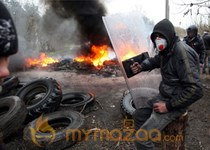Ukraine's Interior Minister said Thursday that three pro-Russian protesters were killed, 13 more were wounded, and 63 were arrested in a confrontation at a military base in the east of the country.
The Wall Street Journal first reported the remarks by Arsen Avakov. The incident occurred at a base in the southeastern city of Mariupol, in the Donbass region of the country, approximately 70 miles south of Donetsk.
Earlier, the Journal reported that a group of insurgents had stormed the base late Wednesday as Ukraine's military drive to regain control of the country's east from separatists was stymied by civilians who halted army columns in their tracks and militants who hijacked Ukrainian military vehicles and drove them around with Russian flags.
At Mariupol, the Ukrainian National Guard said the troops there had refused to comply with demands to surrender their weapons and switch sides. Protesters began rushing the gates and throwing Molotov cocktails, according to the National Guard, and shots were fired.
News of the latest violence came as as diplomats from Ukraine, the U.S., the European Union and Russia prepared to meet in Geneva, Switzerland Thursday for the first time over the burgeoning crisis that threatens to roil the new government in Kiev.
"I think we still have a chance to de-escalate the situation using the diplomatic means," Ukraine's foreign minister, Andrii Deshchytsia, told reporters late Wednesday ahead of the talks. "And we are trying hard."
However, Deshchytsia said the diplomatic discussions also must be tempered with efforts "to look for a more concrete and adequate response to Russia's plans and actions."
Obama administration officials tamped down any expectations that the meetings in Geneva would yield a breakthrough or Russian concessions meaningful enough to avoid new U.S. penalties.
U.S. Secretary of State John Kerry began his day with EU foreign policy chief Catherine Ashton. Asked if he was expecting to make any progress Thursday, Kerry shrugged. He also met one-on-one with Deshchytisa and Russian Foreign Minister Sergey Lavrov.
U.S. officials told the Associated Press Wednesday that the Obama administration is readying additional sanctions against Moscow and a boost in aid for the Ukrainian military in the coming days. The sanctions likely will target more wealthy individuals close to Russian President Vladimir Putin and the entities they run, while military aid could include medical supplies and clothing. It was unclear whether those sanctions would change Putin's calculus, given that the U.S. and the Europeans already have launched targeted sanctions on people in Putin's inner circle.
"Each time Russia takes these kinds of steps that are designed to destabilize Ukraine and violate their sovereignty, there are going to be consequences," President Barack Obama said Wednesday in an interview with CBS News. "Mr. Putin's decisions aren't just bad for Ukraine. Over the long term, they're going to be bad for Russia."
Officials said a full-scale Russian invasion of eastern Ukraine would result in broad U.S. and European sanctions on key Russian economic sectors, including its powerful energy industry. However, European nations are divided on whether to limit its access to Russia's oil and gas supplies, and a vote to sanction must be unanimous among the EU's 28 member states.
The U.S. military aid was expected to stop short of body armor and other equipment for Ukraine's troops. Additionally, the Obama administration is reluctant to send weapons and ammunition, as Kiev has requested, amid fears that lethal supplies would be seen as an escalatory step by the U.S. and trigger a more aggressive response from the estimated 40,000 Russian forces massed on its border with Ukraine.
Despite the diplomatic freeze between Moscow and Kiev, a senior State Department official said Ukraine's negotiators planned to try to assuage Russia's concerns during Thursday's talks. Deshchytsia and his team were expected to brief Russia and the other diplomats on what Kiev was doing to transfer more power from the central government to the regions, including letting local areas keep more of their funding and elect their own leaders.
The Ukraine diplomats were prepared to field questions from negotiators and even seek Russia's advice on how to quell concerns in Moscow about the rights of Russian-speaking minorities in Ukraine and the approaching May 25 presidential elections to ensure they are inclusive for all candidates.
Ukraine's outreach during Thursday's talks would help test whether Russia was willing to respond to a diplomatic solution to the crisis, said the U.S. official, who was not authorized to publicly discuss the issue by name and spoke on condition of anonymity.
In Brussels, NATO chief Anders Fogh Rasmussen said the military alliance would increase its presence in Eastern Europe, including flying more sorties over the Baltic region west of Ukraine and deploying allied warships to the Baltic Sea and the eastern Mediterranean. NATO's supreme commander in Europe, U.S. Air Force Gen. Philip Breedlove, told reporters that ground forces also could be involved at some point, but gave no details.
So far, the military movements and two initial rounds of sanctions against Russians and Ukrainians accused by the West of stirring up the unrest have done little to ease tensions.
Ukraine's military launched its first actions against the pro-Russian forces on Tuesday. A day later, in the eastern Ukraine city of Slovyansk, pro-Russian insurgents took over six Ukrainian armored vehicles along with their crews and hoisted Russian flags over them before driving into town. The Ukrainian soldiers manning the vehicles offered no armed resistance, and masked pro-Russian militias in combat fatigues rode on top of the vehicles in a defiant rejection of Kiev's hope to re-establish control over the restive region.
Insurgents in Slovyansk have seized the police headquarters and the administration building, demanding broader autonomy for eastern Ukraine and closer ties with Russia. Their actions have been repeated in at least eight other cities in eastern Ukraine. The central government says Moscow is provoking the unrest.







